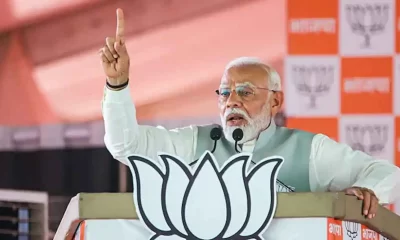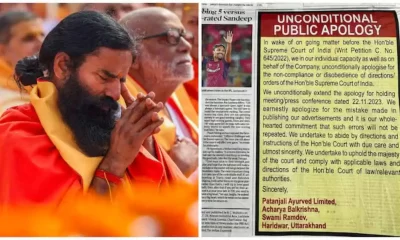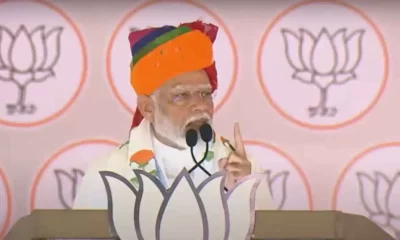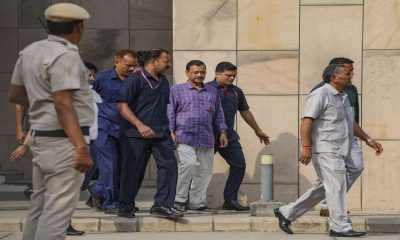9 state elections held in 2023


A video of Karisma Kapoor and Madhuri Dixit’s dance performance was shared by Colors TV on social media. In the...


The video clip was posted by a restaurant’s Instagram account Nini's Kitchen and was titled Ghar se door, ek waiter....


Ruturaj Gaikwad’s century was overshadowed by Australia’s Marcus Stoinis who smashed a stunning century to help LSG seal a thrilling...


In the short video clip that was recorded by Instagram user Zibran, an electric car is seen parked at a...


In the video Dolly is seen arriving in a car at Burj Khalifa. As he gets down, he is accompanied...


Manisha Koirala, who is making a comeback with 'Heeramandi', spoke about declining a Yash Chopra film.


Atif Aslam’s reaction towards his female fan was praised by a number of individuals who were attending the concert and...


President Draupadi Murmu presented the Padma Bhushan awards to veteran actor Mithun Chakraborty and legendary singer Usha Uthup in New...


Yashasvi Jaiswal looked in top class form as he was the top-scorer of Rajasthan Royals with 104 runs off 60...


The official spokesperson of Ranveer Singh has confirmed that anFIR has been lodged by the Cyber Crime Cell.


The makers of Kalki 2898 AD finally released Amitabh Bachchan's first look as Ashwatthama on April 21.


Google celebrated Earth Day 2024 with a special doodle featuring an aerial view of our planet's biodiversity.


Tiger Shroff recently dropped an inspiring video from his rigorous workout session and flaunted his muscular biceps


A disturbing video of the incident - which was unfortunately streamed live on X (formerly Twitter), including by his own...


PM Modi was speaking at a public meeting in Chhattisgarh's Surguja, where he alleged that the Congress wants to fill...


Gandhi further added that everyone should look at Prime Minister Narendra Modi’s reaction and said that the moment he said...


In the apology published, Ramdev and Balkrishna said they unconditionally apologise in their individual capacity as well as on behalf...


PM Modi slammed Congress during a rally in Chhattisgarh, ahead of the Lok Sabha elections 2024


Amit Shah revealed the BJP's target for West Bengal and said they have set a target of winning 35 Lok...


PM Modi was addressing an election rally in Rajasthan's Tonk-Sawai Madhopur, on a day as India celebrates Hanuman Jayanti.


Sharad Pawar said that former prime ministers worked to make a new India but PM Modi only criticises others and...


One gun and some cartridges have been recovered from the Tapi river in Surat by the Mumbai Crime Branch in...


Finally, the BJP and its jail administration came to their senses and gave insulin to CM Arvind Kejriwal in jail,...


The Samajwadi Party (SP) has fielded Tej Pratap Singh Yadav for the parliamentary seat in Uttar Pradesh, putting an end...


BJP's Surat Lok Sabha candidate Mukesh Dalal has won the seat unopposed


Delhi Chief Minister Arvind Kejriwal, jailed in the now-scrapped liquor policy case, said he had been requesting insulin daily due...


The India Meteorological Department (IMD) has predicted that Odisha, Bengal, Jharkhand, Bihar will continue to face severe heatwave over next...


Addressing the INDIA bloc's rally in Ranchi, Sunita Kejriwal lashed out at the Centre and claimed conspiracy to kill her...


Union home minister Amit Shah will be campaign is expected to start at 4:30 pm today












































































































































APN News is today the most watched and the most credible and respected news channel in India. APN has been at the forefront of every single news revolution. The channel is being recognized for its in-depth, analytical reportage and hard hitting discussions on burning issues; without any bias or vested interests.


Rinku Singh asked Virat Kohli for another bat after breaking the one he received after the last KKR vs RCB...


Top leaders of the Opposition INDIA bloc will attend the mega Ulgulan (uprising) Nyay rally in Ranchi today


Anand Kumar shared a picture with Sandeep Chaudhary in a heartfelt post and wrote that many such incidents have happened...
© Copyright 2022 APNLIVE.com